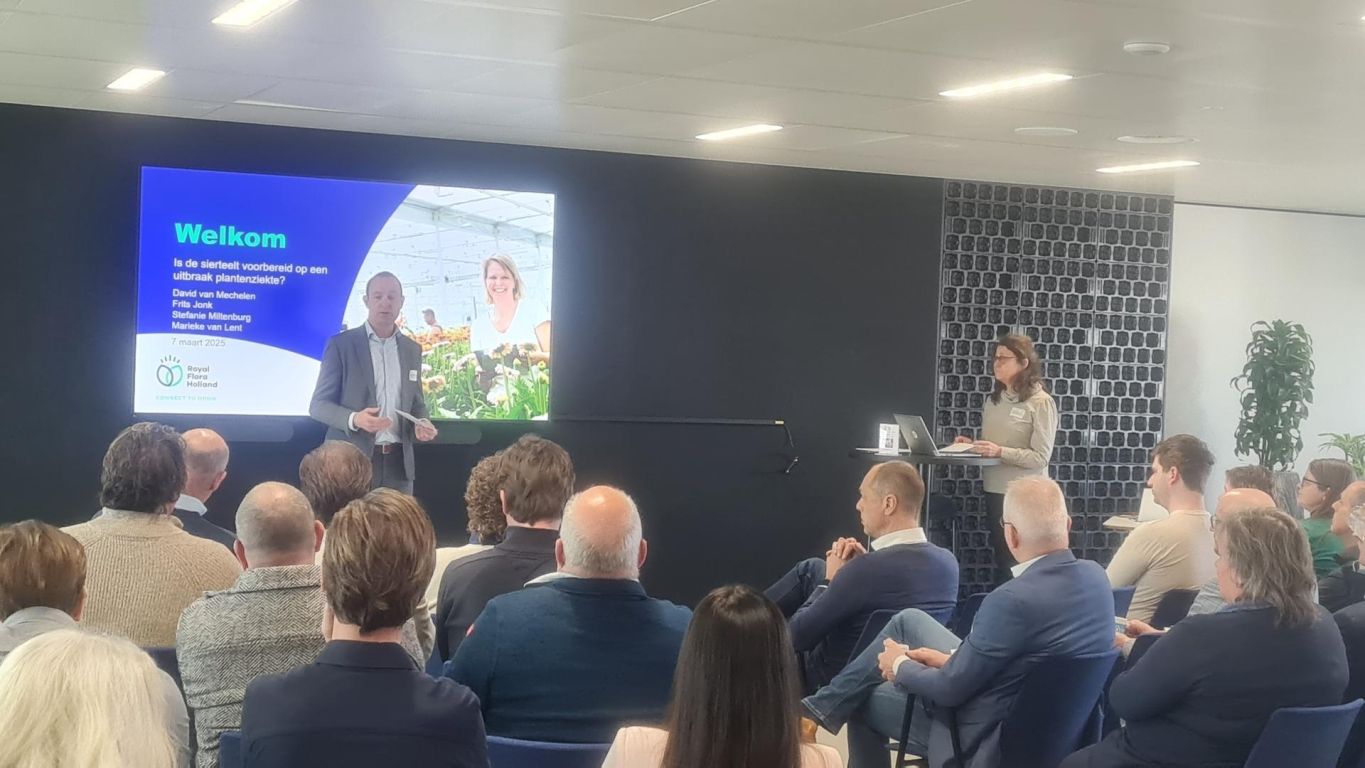Is the floriculture sector prepared for an outbreak of plant disease?
March 10, 2025

What can the floriculture sector expect in the event of an outbreak of a Q organism such as Xylella? This question was the focus of the first administrative knowledge session on the subject in the floriculture sector on 7 March. The session was organised on the initiative of Royal FloraHolland and held in Aalsmeer. In his words of welcome, David van Mechelen, CFO of Royal FloraHolland, emphasised the importance for the entire floriculture sector to be well prepared for these incidents.
A Q is a plant disease that must be controlled, and in the event of an outbreak, the government must do everything in its power to eliminate it. This can have significant consequences, as was previously experienced with the outbreak of longhorn beetles in Boskoop in 2010. That outbreak not only hit the sector hard, but also destroyed citizens' gardens and trees in the neighbourhood. In 2015, Ralstonia broke out in Roos. The affected companies were cleared and four were forced to close after the outbreak.
Outbreak has huge impact
In the event of an outbreak with a Q for Xylella, the measures will not only apply to the affected company, but a large area will be cordoned off. No host plants may be transported from that area for a long period (years). A disaster scenario for growers, the associated trading companies, Royal FloraHolland and the municipalities. The knowledge session explored whether we are administratively prepared for such an outbreak. Whether we know how to find each other and who has which powers and responsibilities. And how you can be prepared for this. In the knowledge session, experiences were shared and a case study was practised. All to arrive at a shared picture of the possible risks and consequences.
Animal sector as an example
Wyno Zwanenburg has experienced outbreaks in the animal sector in various roles. As an entrepreneur, as a member of a ministry crisis team, as a director of the POV and product board. He shared the lessons learned from the animal sector over the past 30 years. It became clear that an outbreak forces difficult choices: the (international) trade interests of the Netherlands versus the interests of individual entrepreneurs. In consultation with the sector organisations, the ministeris responsible for those decisions.
Minister in the lead in case of plant disease outbreak
The director of the Netherlands Food and Consumer Product Safety Authority (NVWA), Corné van Alphen, outlined the risks lurking in floriculture and the range of measures available to the sector and the surrounding area. He gave a concrete example of a possible outbreak of Xylella in Aalsmeer. Daniëlle Kroes of the Ministry of Agriculture, Nature and Food Quality emphasised the importance of good crisis management and how the roles are reversed. When fighting an animal or plant disease, the Minister of LVVN is in charge, not the mayor, as with other crises or disasters. Alderman Anouk Noordermeer shared how her municipality of Alphen aan den Rijn has prepared for possible outbreaks in Boskoop. Experiences in 2010 and the exercises that the tree nursery has done over the past five years have taught us that the consequences are not only for the entrepreneurs or exclusively material. An outbreak impacts the entire region, especially if many inhabitants are directly or indirectly dependent on the plant supply chain. Regarding their script, she said: ‘You work very hard on something you hope you will never need’.
Crisis exercise
Groups practised using a realistic case study: the outbreak of Xylella at two commercial nurseries. One in de Kwakel and one in Aalsmeer, on the Rijssenhout side. The demarcation of the areas touched each other, resulting in a large area between Uithoorn, the A4 motorway and Schiphol being closed off for several years, with the RFH hub at the region's centre. The exercise showed how important it is to know how to find each other. We are still insufficiently prepared for a crisis. The contingency plans the government is working on are an essential part of the follow-up: practising the measures that have been worked out in them. That follow-up has been promised.
Participants
The following administrators and organisations participated in the information session: Ministry of LVVN, NVWA, Naktuinbouw, KCB, B&W of the municipalities of Katwijk and Alphen aan den Rijn, security regions, RFH and Plantion, representatives and administrators of sector organisations and branch organisations, including various entrepreneurs.
A Q is a plant disease that must be controlled, and in the event of an outbreak, the government must do everything in its power to eliminate it. This can have significant consequences, as was previously experienced with the outbreak of longhorn beetles in Boskoop in 2010. That outbreak not only hit the sector hard, but also destroyed citizens' gardens and trees in the neighbourhood. In 2015, Ralstonia broke out in Roos. The affected companies were cleared and four were forced to close after the outbreak.
Outbreak has huge impact
In the event of an outbreak with a Q for Xylella, the measures will not only apply to the affected company, but a large area will be cordoned off. No host plants may be transported from that area for a long period (years). A disaster scenario for growers, the associated trading companies, Royal FloraHolland and the municipalities. The knowledge session explored whether we are administratively prepared for such an outbreak. Whether we know how to find each other and who has which powers and responsibilities. And how you can be prepared for this. In the knowledge session, experiences were shared and a case study was practised. All to arrive at a shared picture of the possible risks and consequences.
Animal sector as an example
Wyno Zwanenburg has experienced outbreaks in the animal sector in various roles. As an entrepreneur, as a member of a ministry crisis team, as a director of the POV and product board. He shared the lessons learned from the animal sector over the past 30 years. It became clear that an outbreak forces difficult choices: the (international) trade interests of the Netherlands versus the interests of individual entrepreneurs. In consultation with the sector organisations, the ministeris responsible for those decisions.
Minister in the lead in case of plant disease outbreak
The director of the Netherlands Food and Consumer Product Safety Authority (NVWA), Corné van Alphen, outlined the risks lurking in floriculture and the range of measures available to the sector and the surrounding area. He gave a concrete example of a possible outbreak of Xylella in Aalsmeer. Daniëlle Kroes of the Ministry of Agriculture, Nature and Food Quality emphasised the importance of good crisis management and how the roles are reversed. When fighting an animal or plant disease, the Minister of LVVN is in charge, not the mayor, as with other crises or disasters. Alderman Anouk Noordermeer shared how her municipality of Alphen aan den Rijn has prepared for possible outbreaks in Boskoop. Experiences in 2010 and the exercises that the tree nursery has done over the past five years have taught us that the consequences are not only for the entrepreneurs or exclusively material. An outbreak impacts the entire region, especially if many inhabitants are directly or indirectly dependent on the plant supply chain. Regarding their script, she said: ‘You work very hard on something you hope you will never need’.
Crisis exercise
Groups practised using a realistic case study: the outbreak of Xylella at two commercial nurseries. One in de Kwakel and one in Aalsmeer, on the Rijssenhout side. The demarcation of the areas touched each other, resulting in a large area between Uithoorn, the A4 motorway and Schiphol being closed off for several years, with the RFH hub at the region's centre. The exercise showed how important it is to know how to find each other. We are still insufficiently prepared for a crisis. The contingency plans the government is working on are an essential part of the follow-up: practising the measures that have been worked out in them. That follow-up has been promised.
Participants
The following administrators and organisations participated in the information session: Ministry of LVVN, NVWA, Naktuinbouw, KCB, B&W of the municipalities of Katwijk and Alphen aan den Rijn, security regions, RFH and Plantion, representatives and administrators of sector organisations and branch organisations, including various entrepreneurs.
-
Did you find this interesting?
Then share this article


